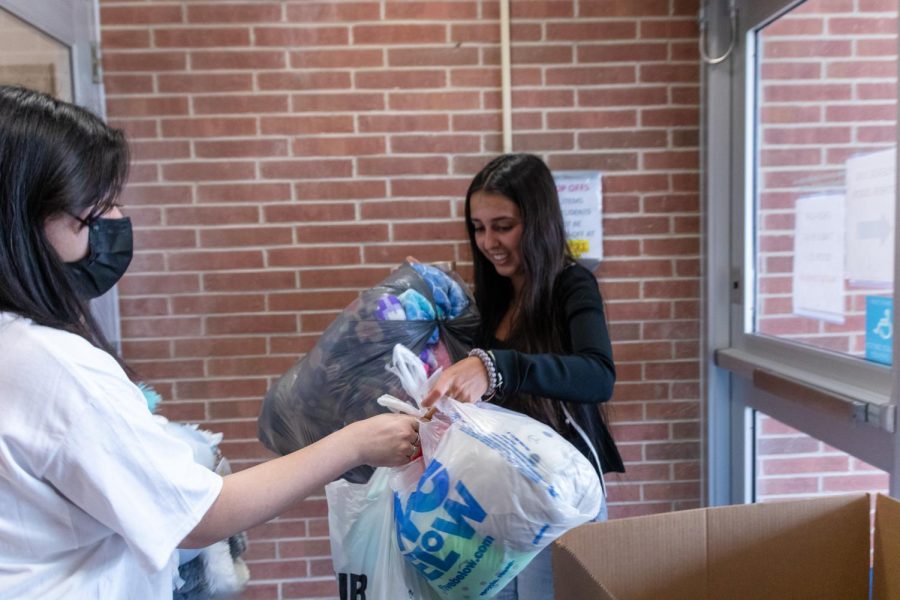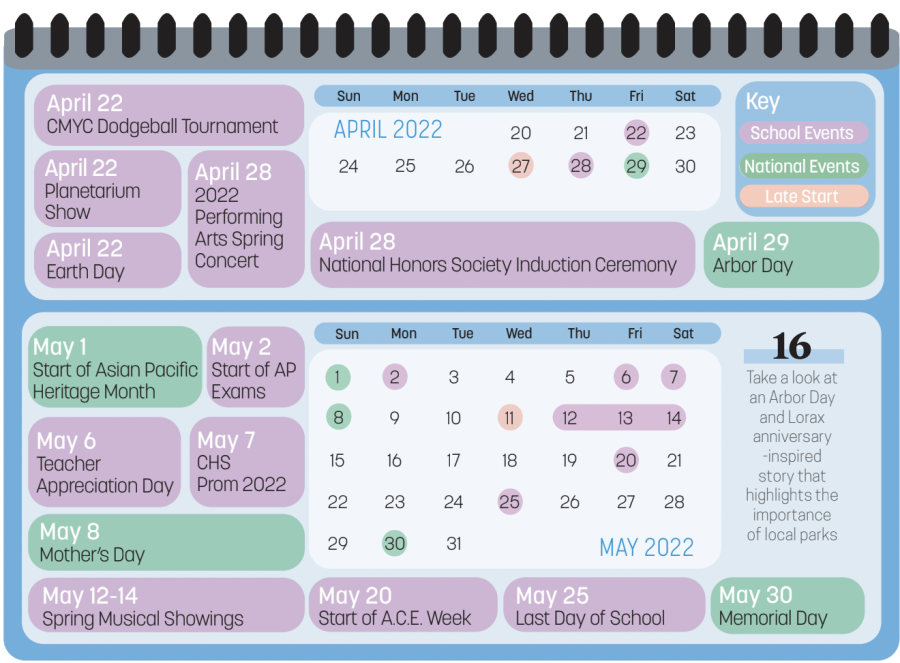“Either the glass is half empty, or the glass is half full, or someone can’t afford a standard sized beverage.”
 The above quote is an example of a recent tweet from senior Blake Penner, a popular tweeter from CHS who has provided humor like this on a daily basis from his Twitter account to over 800 followers since 2008. Penner said his prolific tweeting did not begin until last year with some inspiration from Ali Semssar, senior and tweeter with 498 followers as of March 9.
The above quote is an example of a recent tweet from senior Blake Penner, a popular tweeter from CHS who has provided humor like this on a daily basis from his Twitter account to over 800 followers since 2008. Penner said his prolific tweeting did not begin until last year with some inspiration from Ali Semssar, senior and tweeter with 498 followers as of March 9.
“I just tweet for fun, you know,” Penner said. “A lot of people say exactly what they’re doing at the moment, like, ‘I’m at the mall’ or whatever, but I just say random, funny stuff. It’s mostly funny stuff that I’ll think of during the day.”
However, according to Penner, sometimes someone may find some of his tweets tasteless. And while his tweets rarely touch or go near being illegal, he may be affected as part of Twitter’s announcement on Jan. 26 to block illegal tweets in certain countries.
The announcement on Twitter’s blog stated that the company has recently implemented the ability for it to block tweets within a certain country as opposed to before, when illegal tweets would be deleted from the system altogether. This means that while a tweet may be considered legal in one country, it could be deemed illegal in others and censored from view.
Currently, Twitter users send approximately a billion tweets every four days according to Twitter’s blog. The new filtering feature will only block certain tweets in response to a valid and legal request. The Twitter team will then take into consideration the request and determine whether the tweet should be blocked or not.
While Twitter is attempting to be transparent in the blocking of messages by providing the person who tweeted something illegal a notice and reason as to why a tweet was blocked, some have found the move to be a threat to free speech on the Internet.
“I think it’s becoming a slippery slope just because of the precedent that it potentially sets,” government teacher James Ziegler said. “Ultimately, what is going to be considered illegal?”
Many claim Twitter is justified, if only a little, in its move, as long as it blocks only illegal messages. Computer applications teacher Kathy Mehlhop said she thinks Twitter may be censoring tweets so they do not lose the site completely. But for actual tweet censorship, Mehlhop said it depends on the situation.
“If it deals with something like the privacy of a child, it should be censored,” she said.
Many also point out that Twitter is a privately held company, which should mean it has the right to do what it wants with its service.
“As a private entity that’s kind of taking it up, they’re not held to the same standards as a government organization coming in and mandating it,” Ziegler said. “So it’s a little bit different, so ultimately they have control over how they want the website to be used. So I think they have a right to do that, whether or not I may necessarily agree with it.”
However, Semssar said he does not feel like Twitter is justified if it blocks tweets on its own accord.
“If it’s Twitter itself doing it, I don’t think it’s justified,” Semssar said. “But if it’s the government saying that their countries can’t use Twitter, then I think that it’s the (government’s) problem, then I think (the blockage) would be somewhat justified.”
Still, there is some controversy over Twitter’s announcement, with some saying that this will mark the beginning of self-censorship throughout websites that rely on user-generated content—just as the shutdown of Megaupload, a file-sharing site, has led to other similar sites either shutting down or limiting file sharing between users.
Regardless, Penner said he thinks Twitter has made a bad move.
 “I think that people should be able to express themselves the way they want as long as they’re not hurting anybody or getting anybody bullied or something like that,” he said. “I feel like if they would block illegal messages, it’s more of a block on people’s right to express themselves the way they want. People can protest at funerals and stuff. People can make hateful messages, but you know it might be distasteful, but it’s still legal. People should be able to say what they want to say.”
“I think that people should be able to express themselves the way they want as long as they’re not hurting anybody or getting anybody bullied or something like that,” he said. “I feel like if they would block illegal messages, it’s more of a block on people’s right to express themselves the way they want. People can protest at funerals and stuff. People can make hateful messages, but you know it might be distasteful, but it’s still legal. People should be able to say what they want to say.”
Semssar said he does not support censorship at all, especially online.
“I’m big on free speech,” he said.


































![British royalty are American celebrities [opinion]](https://hilite.org/wp-content/uploads/2024/03/Screenshot-2024-03-24-1.44.57-PM.png)


















![Review: “Suits” is a perfect blend of legal drama and humor [MUSE]](https://hilite.org/wp-content/uploads/2024/04/unnamed-1.png)
![Chelsea Meng on her instagram-run bracelet shop [Biz Buzz]](https://hilite.org/wp-content/uploads/2024/04/IMG_2446-1200x838.jpg)
![Review: Quiet on Set: The Dark Side of Kids TV is the long awaited exposé of pedophilia within the children’s entertainment industry [MUSE]](https://hilite.org/wp-content/uploads/2024/04/unnamed.jpg)
![Review: “The Iron Claw” cannot get enough praise [MUSE]](https://hilite.org/wp-content/uploads/2024/04/unnamed.png)
![Review: “The Bear” sets an unbelievably high bar for future comedy shows [MUSE]](https://hilite.org/wp-content/uploads/2024/03/unnamed.png)
![Review in Print: Maripaz Villar brings a delightfully unique style to the world of WEBTOON [MUSE]](https://hilite.org/wp-content/uploads/2023/12/maripazcover-1200x960.jpg)
![Review: “The Sword of Kaigen” is a masterpiece [MUSE]](https://hilite.org/wp-content/uploads/2023/11/Screenshot-2023-11-26-201051.png)
![Review: Gateron Oil Kings, great linear switches, okay price [MUSE]](https://hilite.org/wp-content/uploads/2023/11/Screenshot-2023-11-26-200553.png)
![Review: “A Haunting in Venice” is a significant improvement from other Agatha Christie adaptations [MUSE]](https://hilite.org/wp-content/uploads/2023/11/e7ee2938a6d422669771bce6d8088521.jpg)
![Review: A Thanksgiving story from elementary school, still just as interesting [MUSE]](https://hilite.org/wp-content/uploads/2023/11/Screenshot-2023-11-26-195514-987x1200.png)
![Review: When I Fly Towards You, cute, uplifting youth drama [MUSE]](https://hilite.org/wp-content/uploads/2023/09/When-I-Fly-Towards-You-Chinese-drama.png)
![Postcards from Muse: Hawaii Travel Diary [MUSE]](https://hilite.org/wp-content/uploads/2023/09/My-project-1-1200x1200.jpg)
![Review: Ladybug & Cat Noir: The Movie, departure from original show [MUSE]](https://hilite.org/wp-content/uploads/2023/09/Ladybug__Cat_Noir_-_The_Movie_poster.jpg)
![Review in Print: Hidden Love is the cute, uplifting drama everyone needs [MUSE]](https://hilite.org/wp-content/uploads/2023/09/hiddenlovecover-e1693597208225-1030x1200.png)
![Review in Print: Heartstopper is the heartwarming queer romance we all need [MUSE]](https://hilite.org/wp-content/uploads/2023/08/museheartstoppercover-1200x654.png)






















![Review: Ladybug & Cat Noir: The Movie, departure from original show [MUSE]](https://hilite.org/wp-content/uploads/2023/09/Ladybug__Cat_Noir_-_The_Movie_poster-221x300.jpg)

![Review: Next in Fashion season two survives changes, becomes a valuable pop culture artifact [MUSE]](https://hilite.org/wp-content/uploads/2023/03/Screen-Shot-2023-03-09-at-11.05.05-AM-300x214.png)
![Review: Is The Stormlight Archive worth it? [MUSE]](https://hilite.org/wp-content/uploads/2023/10/unnamed-1-184x300.png)



